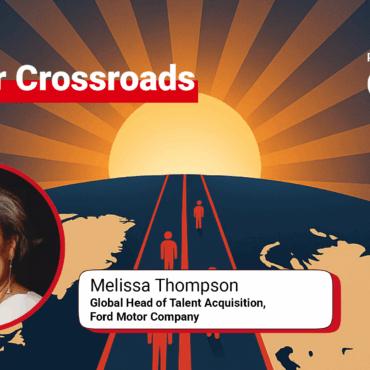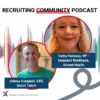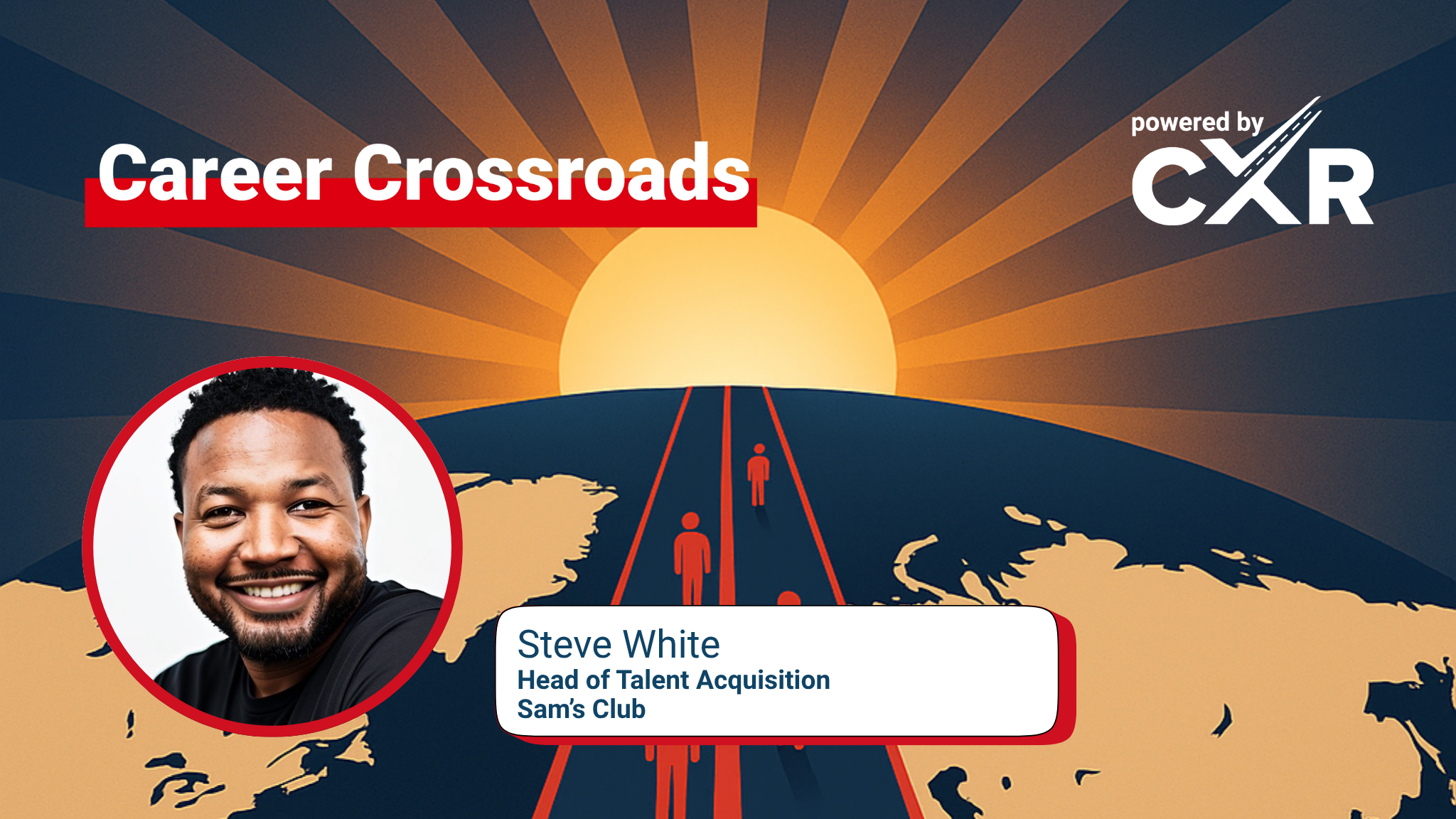
Balancing Strategy and Tactics: Melissa Thompson’s Career Crossroads
Melissa Thompson, now leading global TA at Ford, shares how data, flexibility, and lateral moves shaped a career that spans industries, geographies, and transformations.
 play_arrow
play_arrow
From Sports Agent to TA Leader: Steve White’s Career Crossroads Cami Grace
 play_arrow
play_arrow
Navigating TA Leadership at Land O’Lakes Cami Grace
 play_arrow
play_arrow
 play_arrow
play_arrow
AI in Talent Acquisition Cami Grace

Featured Guests:
Steve White
Hosts:
Gerry Crispin, Co-founder, CareerXroads
Episode Overview:
Gerry Crispin talks with Steve White about his unexpected path into recruiting—from early aspirations in sports management to leading talent acquisition at Sam’s Club. The conversation explores the pivotal moments, mentors, and guiding principles that shaped Steve’s career, including lessons from early roles at AppleOne and a passion for solving business problems through hiring. Steve also shares how a growth mindset and business integration continue to fuel his work in TA leadership.
Key Topics:
Transition from sports agency to recruiting
Early career influences at AppleOne
Key leadership lessons from mentors
Importance of mindset and culture in TA
Business integration and partnership in recruiting
Staying engaged through learning and innovation
Perspectives on leadership and career longevity
Notable Quotes:
“The most important person you’ll ever speak with is the person you’re speaking with—as far as they’re concerned.”
“The value we bring is a reflection of the problems we solve.”
“If I can’t be embedded in the business—if I can’t do the things we talked about—then I’m not your guy.”
“Get out front, and stay out front. Never stop learning.”
Takeaways:
Steve White’s journey underscores the power of transferable skills, mentorship, and staying curious. From recruiting athletes to solving business problems through TA, his story reveals how core principles and deep partnerships drive success and engagement over time.
Want more conversations like this?
Subscribe to the CXR podcast and explore how top talent leaders are shaping the future of recruiting. Learn more about the CareerXroads community at cxr.works.
Gerry Crispin: Good day, everyone. This is Gerry Crispin at CareerXroads, talking to Steve White—actually, one of my favorites. We’ve spent a few hours together over the last week, so it’s good to continue to see our paths keep crossing. The whole purpose of this next 20 minutes is to explore something I’ve been a bit obsessed with lately.
In the beginning, CareerXroads was really looking at two types of decisions—one by the employer and the other by the candidate. We spent most of our history looking at the employer’s decision, how that needed to improve, and the factors that should be taken into account.
I’ve started a series talking to folks who’ve been out there a while about how they got into this work—and why they’ve stayed. I’ve got five questions. The first one, Steve, is: can you go back and remember the first time you thought, “What the heck is this? It’s called recruiting”? How did you break into recruiting?
Steve White: Oh my gosh. I was in an interesting spot in life—probably not unlike so many others you’ve talked to or will talk to. My dream in life was to be a general manager of an NFL team. I love football—college football especially.
Gerry Crispin: Given the story you told last week, some strings are starting to come together.
Steve White: Right? So, I loved football. Early in college, I interned for the LA Clippers. Basketball, not football—there was no football team in LA at the time. That internship was great. I met some amazing people—Mark Cuban, Magic Johnson, others in the sports management and agency world.
That led me to another internship at a small sports management and entertainment firm. That continued to fuel my passion for sports, but also sparked an interest in recruiting. Being a sports agent is really recruiting—you have to recruit athletes.
Gerry Crispin: It’s a different form of representation, but yes, recruiting.
Steve White: Exactly. I started to love what I call “the chase”—which is really what recruitment is. I was recruiting athletes transitioning from college to the NFL. Basically chasing athletes across the country—it was intense but a lot of fun.
Eventually, though, it became taxing on my family—lots of travel. I had promised myself I’d never sacrifice my family on the altar of success. So, I started thinking about balance—what’s important to me, and what’s next.
At the time, my wife was eight months pregnant with our second child, and I was in Honolulu for the Hula Bowl—which doesn’t even exist anymore. That was a wake-up call. I began looking for a way out, but I still loved recruiting: building plans, pitching value, convincing athletes to join our agency.
Some people I met suggested staffing could be a good fit—still in the same vein. I was like, “I don’t even know what that is.” But I learned more, made some connections, and eventually landed a job in staffing.
Gerry Crispin: Where was your first job in staffing?
Steve White: I worked for AppleOne. Bernie Howroyd, Roy, and that whole crew. I was lucky enough to be in California at the time and worked in the number one AppleOne office in the country, under a phenomenal leader named Armina Suke.
Gerry Crispin: Wow. That’s fascinating. I should have known that. I suspect those early jobs still provide great stories when you’re engaging with clients. I can just imagine—“This guy used to be an agent!”
Steve White: Right? People love the stories—it opens the door for great conversations.
Gerry Crispin: When I started recruiting, I had an engineering degree and had worked as an engineer. So when I met with engineers, they’d say, “Oh really?” That background helps connect.
As you began to grow in recruiting, though, you’ve had to figure out what makes a job right—or wrong—for you. What did you learn to ask yourself when considering your next opportunity?
Steve White: Thinking back to AppleOne, being lucky to be there at that time with Bernie and Armina—they shared early principles that were transformational for me.
Bernie used to say, “The most important person you’ll ever speak with is the person you’re speaking with—as far as they’re concerned.” That shaped how I treated candidates and focused on their experience.
Armina constantly encouraged me. She’d say, “This is just a stop on your journey. You’re not going to be in this role long.” She helped me understand what to do, who to build relationships with, and connected me with leaders like Bernie, Richard Wilke, and Sandy Krab.
That mentorship helped me pivot from a free-flowing sports management lifestyle to a more structured corporate mindset. Their regular advice and support propelled me forward—I moved to Texas, built strong relationships, and kept growing from there.
Gerry Crispin: So you got a few lessons early that really helped shape your path—and you’ve since worked at BECU, Walmart, and now Sam’s Club. From where you sit today, what has changed, and what’s still true?
Steve White: The principles from Bernie and Armina—those weren’t just practices, they were universal truths. Principles last a lifetime.
Gerry Crispin: That gives me an idea. Maybe we could collect those principles from different people—make a short book or list. Could be a great resource.
Steve White: I’d love to participate in that. Bernie even had everyone read As a Man Thinketh—that was part of our indoctrination. And those simple but powerful ideas: “The most important person is the one you’re speaking with,” “A bird in the hand is worth two in the bush”—they stick with you.
Gerry Crispin: That’s about building culture—the kind of culture that makes someone successful. Hard work is expected, but it’s also about your mindset, attitude, and how you treat others.
Where you are in your career now is impressive. But what is it that keeps you engaged? What fascinates you about staying in recruiting and TA leadership?
Steve White: I tell my teams this: the value we bring is a reflection of the problems we solve.
Talent acquisition gives us the opportunity to solve complex problems through hiring practices and partnerships. Just today, I was talking with a leader at Sam’s Club about his goals for the next fiscal year. He said, “Here’s where I could use your help.” Normally, it’s me saying that—but this time it was him. That kind of partnership is what keeps me excited.
When we get to be thought partners, helping solve business problems—there’s nothing better. Whether it’s through strategy, tech, or just deep understanding, we can bring real value. And not just around headcount—every problem has people implications.
When I interviewed here, I told the Chief Product Officer: “If I can’t be embedded in the business—if I can’t do the things we talked about—then I’m not your guy.” He kept his promises. I’ve been in his meetings, close to his team, part of the process. That kind of access and inclusion—that keeps me energized.
Gerry Crispin: I love that. It reminds me of when I joined J&J in a leadership role. I said to the head of marketing and sales, “I want to spend a week with your best salesperson and a week with your worst.” He looked at me funny, but I said, “How else am I going to help?”
Steve White: I love that—being close to the problems, understanding what’s really going on.
Gerry Crispin: It shows them how seriously you’re taking your role—and the business.
Last question: with all the uncertainty we’re facing today, if you met someone like your younger self—what advice would you give them?
Steve White: I’d say: get out front, and stay out front. Never stop learning. That’s something you live by, Gerry—being a lifelong student.
Lean into learning. You don’t need to know everything, but be curious. Understand the market, the business, the tech—especially with AI changing the game.
At a recent CareerXroads event, we talked about the evolution of the workforce—from the Industrial Revolution to the rise of the “super worker.” To stay relevant, you need to be a thought leader, not just a subject matter expert.
So—growth mindset. Keep learning. Keep showing up.
Gerry Crispin: I’ll be looking forward to more of your sports stories. That coaching story you shared really stuck with me. That kind of attitude is something we all need.
Thank you so much for your time today, Steve. I really appreciate it.
Steve White: Always an honor to spend time with you, Gerry. Appreciate you.
Announcer: Thanks for listening to the Recruiting Community Podcast, where talent acquisition leaders connect, learn, and grow together. Visit cxr.works/podcast to explore past episodes, see what’s coming up next, and find out how you can join the conversation. Interested in becoming a CXR community member? Visit www.cxr.works. We’ll catch you in the next episode.
Tagged as: professional growth, Leadership, Career Crossroads, Talent Acquisition, Human Resources, Steve White, Sam’s Club, Walmart.

Melissa Thompson, now leading global TA at Ford, shares how data, flexibility, and lateral moves shaped a career that spans industries, geographies, and transformations.
